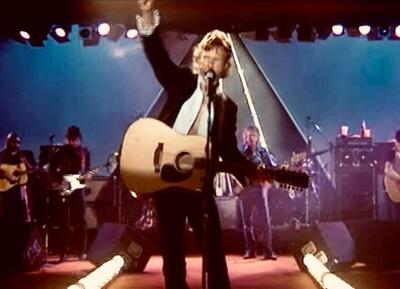I walked out of "Megacrapolis" after a half hour to sit out the remainder at the bar of the Pasadena Playhouse. (Praise be, many theaters now understand how much we need booze.) The wonderful bartender, George, in his snake-themed Hawaiian shirt, quietly announced that Kris Kristofferson had died, and after administering my anesthesia, used his magic remote to light up the flat screen with a K.K. flick.
What luck: It was "Convoy" (1978), a trucker epic directed by the heroic Sam Peckinpah and featuring the gnarly mugs of Ernest Borgnine and Burt Young, plus a frizzed-up, deep-tanned Ali MacGraw passing for, one imagines, an African-American. Pure exploitation garbage, with Kristofferson's "Rubber Duck" character becoming a leader just because he represents the No vote against the establishment. So -- a classic.
"Convoy" stands as one of many instances where Kristofferson squeezed into unlikely situations and emerged with his integrity untarnished. I vividly recall gazing up his 7-foot nostrils at the Cinerama Dome as he made amour with Barbra Streisand in the glossy 1976 "A Star Is Born," and admiring how just being quiet allowed him to get away with a precarious career move that could have toppled into embarrassment. He always had to take off his shirt, because he had an athletic torso. "Okay, I'm taking my shirt off. I do that every night." That also seemed to be his offhand approach to reading a line. Mel Gibson hired Kristofferson for "Payback" (1999) so he could sit behind a desk; fine. He actually seemed less comfortable when he was working with edgier directors such as Michael Cimino in "Heaven's Gate" (1980) or Alan Rudolph in "Trouble in Mind" (1985). He rolled easy in "Semi-Tough" (1977) as a football player. This was one Rhodes Scholar who possessed the common touch.
Hollywood wanted Kristofferson for his cred, but music was his true love, no matter how good he was at being himself onscreen. His mumble-crooned versions of his own "Help Me Make It Through the Night" and "Loving Her Was Easier" and "Nobody Wins" were as good as or better than those by singers with pipes, because, like his acting, they didn't feel like performances.
Kris Kristofferson could rock, as he showed in the 1984 country-Iliad film "Songwriter" slogging slow through "Under the Gun." Mostly we remember how deeply his songs could touch us with a few true words. I liked it that he changed "I don't care what's right or wrong" to "I don't know." He waited until 1995, in a collaboration with Danny Timms, to deliver one of his simplest and most heart-pulling messages, "A Moment of Forever."
Now Willie's the only Highwayman left on the road to eternity. Stick 'em up. You don't mind being cleaned out by bandits like Willie Nelson, Johnny Cash, Waylon Jennings and Kristofferson, because they give so much.
* * *
Read MetalJazz's 2011 live review of Merle Haggard & Kris Kristofferson here.

